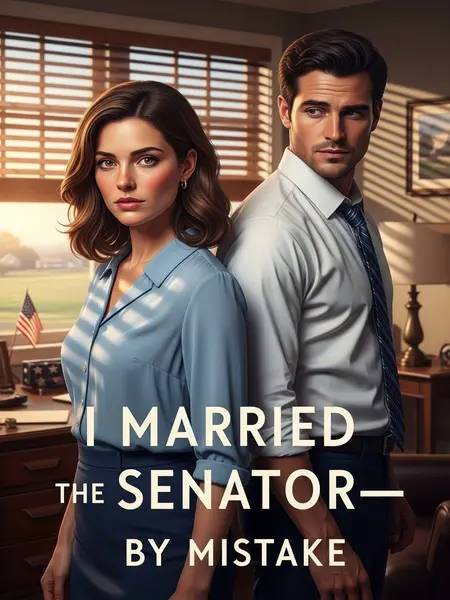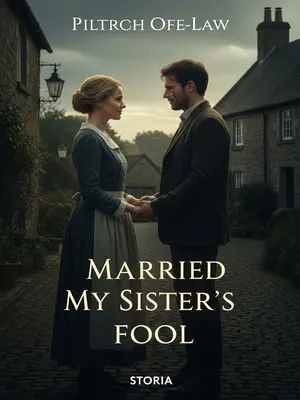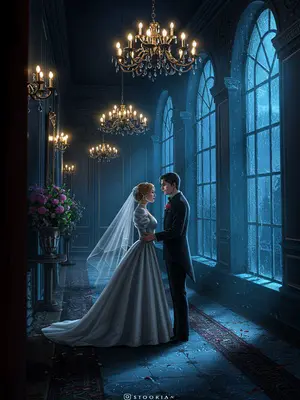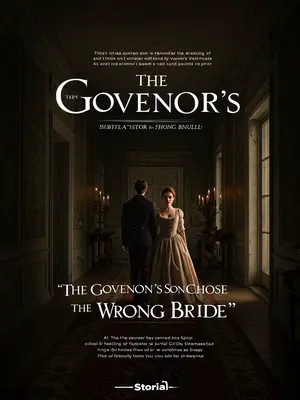Chapter 2: The Wedding Night Ultimatum
The wedding was as over-the-top as you’d expect. It started before sunrise and didn’t end until late. I finally collapsed onto the king-sized bed in the senator’s townhouse, catching my breath.
There were more flowers than at the state fair, and enough cake to feed the whole county. My feet ached from hours in heels, my cheeks hurt from smiling for photos. The townhouse was finally quiet, that deep hush that settles after a big event, and I felt both relieved and a little lost in this strange new place.
Now it was quiet, but I was a bundle of nerves, clutching my dress and wondering what I’d say to Owen when he showed up.
My fingers twisted the satin, nerves jangling. I checked the clock—midnight. The silence pressed in, broken only by the distant hum of traffic and the ticking of an old clock on the mantel.
Okay. Top priority: survive this wedding night.
I’d heard enough horror stories from friends about awkward wedding nights, but this was next-level. My mind ran wild with worst-case scenarios, from forced small talk to sleeping in separate rooms.
In the original novel, the senator’s wedding night barely got a mention. I remembered Harper throwing herself at him, Owen already cold and distant, so he spent the night working in his office and never touched her again.
It was the kind of scene that always made me roll my eyes—so much buildup for so little payoff. Still, at least it meant I wouldn’t have to deal with any drama tonight. Or so I hoped.
Classic case of trying too hard and ending up with nothing.
If there’s one thing romance novels have taught me, it’s that desperation never works. The more you chase, the faster they run.
I figured the original Harper lost because she was too pushy and impatient. She genuinely liked Owen, but after he fell for Marissa, she got jealous, which led her straight to disaster.
Jealousy is a beast, especially in a town where everybody knows your business. Harper’s downfall was practically written in the margins of the book.
So, when it comes to "how to deal with Owen," shouldn’t I just do the opposite of the original Harper?
If Harper’s story was a cautionary tale… maybe I could rewrite my own ending. Play it cool, keep my distance, and maybe—just maybe—avoid a total train wreck.
I was still plotting when I heard the door open and a blast of cold air and whiskey drifted in. The man, dressed in a crisp black tux like me, stopped in front of me and gently lifted my veil.
His cologne mingled with the scent of whiskey, and for a second, the world narrowed to just the two of us. He moved with quiet confidence. The kind that comes from years of being watched, judged, and never letting it show.
I looked up. The guy in front of me was handsome and sharp—young, but already with a hint of authority. He reminded me of a young JFK from a Netflix docudrama.
His jawline could’ve been chiseled by Michelangelo, and his eyes held secrets. I got why the original Harper fell so hard—and why she crashed just as fast.
Being a sucker for a good-looking face, I blurted, “Wow, you’re really good-looking.”
I couldn’t help it—the words just tumbled out, like my filter had taken the night off. For a second, I wanted to disappear into the carpet.
Owen looked genuinely surprised by my first words. He raised an eyebrow. “I heard the mayor’s daughter is infatuated with me. Tonight…”
His tone was formal, but there was a flicker of amusement in his eyes, like he wasn’t sure whether to be flattered or wary.
I snapped out of my daze fast.
The room suddenly felt too small, the air thick with expectation. I knew I had to act before things got awkward.
Before he could finish, I flipped my skirt, dropped to my knees for dramatic effect, and launched into my prepared speech: “I know my feelings are one-sided. Just being able to marry you is already the biggest blessing. I don’t expect anything more—just hope you won’t hate me, and I’ll be content.”
I put every ounce of fake sincerity into the words. Channeled every soap opera I’d ever watched. The gesture was so over-the-top, I figured it’d at least throw him off.
As soon as those syrupy words left my mouth, I shuddered.
It was like biting into a lemon—sour and uncomfortable. My cheeks burned, and I wanted to crawl under the bed.
Owen was probably caught off guard too and just stared at me.
He looked at me like I’d just started speaking in tongues. For a moment, I wondered if I’d gone too far, but then I remembered: better awkward than desperate.
I peeked up and saw him reaching to help me up. “You’re more sensible than I expected. Don’t worry, you’re the mayor’s daughter; you’ll be treated well here.”
His voice was gentle, but the message was clear: this was a business arrangement, not a love story. I could practically see the invisible wall he’d put up between us.
I heard the subtext loud and clear: you’ll have a good life, but don’t expect romance. Don’t get in my way.
It stung a little, but I reminded myself that this was the best-case scenario. No drama, no heartbreak—just mutual respect and a big house to myself.
Message received. I won’t bother you—promise.
I mentally saluted him, promising myself to be the most low-maintenance spouse in the history of political marriages.
I was about to reply, but Owen waved a hand and said, “I’ve got a lot on my plate right now. I’ll be in my office. No need to wait up.”
His tone was brisk, but not unkind. I watched him leave, the door clicking shut behind him, and felt a strange sense of relief.
Before I could say anything else, he was gone.
I exhaled, realizing I’d been holding my breath. Alone at last, I let my shoulders slump and tried to shake off the tension.
Got it. Owen’s a workaholic, married to his job, probably not into romance right now.
Honestly, I could think of worse things. At least he wasn’t the type to bring drama home from the office—or so I hoped.
But hey, a hardworking senator is better than a lazy one.
If nothing else, I respect his dedication. Who knows, maybe I could even learn something about time management.
I was just about to peel off my heavy dress when my maid, April, hurried in. I beckoned her over. “April, come help me out of this thing.”
April rushed in, all nerves and jittery energy, her arms full of pins and safety scissors. She reminded me of that friend who always has snacks in her purse and tissues up her sleeve—reliable, if a little high-strung.
While she helped me change, April looked worried. “Miss, is the senator mad? Why isn’t he staying with you tonight?”
She spoke in a hushed voice, glancing nervously at the door as if expecting Owen to burst in at any moment. Her concern was genuine, and I felt a pang of guilt for dragging her into my mess.
I explained patiently, “He’s got a lot of work to do. That’s normal.”
I tried to sound reassuring, but I could tell she wasn’t buying it. In her world, a wedding night meant romance, not spreadsheets and late-night phone calls.
“But it’s your wedding night! Couldn’t he make a little time for you? Miss, didn’t you want to try to win him over?”
She sounded almost scandalized, like I’d broken some sacred marital rule. I could just imagine her mom back home shaking her head in dismay.
“April, you’re missing the big picture. Personal feelings don’t trump public service.”
I tried to channel my inner First Lady, all poise and composure. But deep down, I was just as confused as she was.
“Miss, you weren’t saying that last week! You said you’d do anything to win his heart!” April huffed.
She was right, of course. At least, the original Harper had been. I had to remind myself this was a new chapter. I was writing the script now.
I waved her off, pulling off my earrings. “That was then. Now I’m the senator’s wife, I have to act like it.”
I tried to sound grown-up, but the earrings caught in my hair, and I nearly yelped. April smirked, but helped untangle me without a word.
April still looked like she wanted to argue, but I cut her off before she could say anything. “Don’t worry. I’m exhausted after all this. Help me clean up—I want to get some sleep.”
I could see the wheels turning in her head, but she bit her tongue and got to work, fussing over my hair and smoothing out the sheets. Her loyalty was touching, even if her priorities were a little old-fashioned.
April sighed, muttered something under her breath, and went to run a bath.
She disappeared down the hallway, muttering about men and their priorities. I almost laughed—some things never change, no matter what world you’re in.
Finally, I was done dealing with people. Maybe tonight I’d actually get some rest, and for now, I didn’t have to worry about sharing a bed with the senator.
I slipped under the covers, the soft cotton sheets a welcome relief after a day of scratchy lace and stiff smiles. For the first time all day, I let myself relax, sinking into the mattress and letting my mind drift.
Before I drifted off, I thought: to be fair, the original Harper had good taste.
I smiled to myself, remembering the way Owen’s eyes had softened for just a second. Maybe, just maybe, there was hope for this story after all.
The next morning, April dragged me out of bed early, pushed my groggy self to the vanity, and got the house staff to help me get ready.
She moved with military precision, barking orders like a drill sergeant. The staff scurried around, laying out dresses, ironing shirts, and making sure every hair was in place. I barely had time to blink before I was dressed and ready to face the day.
I yawned and asked, “April, how do you wake up so early every day?”
She shot me a look that could curdle milk. “Miss, what are you talking about? Today you have to go with the senator to meet the governor and his wife. Don’t tell me you forgot?”
Her tone was pure exasperation, but I could tell she was worried about making a good impression. The governor’s wife was the kind of woman who noticed everything—late arrivals, wrinkled collars, chipped nail polish. I shuddered at the thought.
“Of course not, but the senator’s not here. I can’t go by myself.”
I’d already thought about this. Should I give Owen a heads-up? Should we pretend to be the happy couple, or keep it formal?
I mentally ran through every possible scenario, from hand-holding in the car to awkward silences over coffee. None of them felt quite right.
Do the governor and his wife know we didn’t spend the night together? Is this going to be one of those awkward ‘where are the grandkids’ conversations?
I could already picture the governor’s wife raising an eyebrow, her questions as pointed as her manicure. My stomach churned at the thought.
As I was thinking, a smooth male voice came from the door: “Mrs. Whitman, the senator is waiting for you in his office.”
The voice was deep and calm, with just a hint of Southern charm. It made me sit up a little straighter, suddenly aware of every wrinkle in my dress.
Must be his assistant. The voice was nice, so I called back, “Thanks! Tell him I’ll be right there.”
I tried to sound confident, but my voice cracked on the last word. April rolled her eyes but didn’t comment.
April hustled the staff, and soon I was ready and on my way.
She handed me a travel mug of coffee, whispering, “You’ll need this.” I took it gratefully, savoring the warmth in my hands as I headed down the hall.
I thanked April for her efficiency, then hurried to the office—only to run right into Owen coming out.
He was checking his watch, looking every inch the polished politician. For a second, I felt like a high schooler about to ask the quarterback to prom.
Today he was in a sharp navy suit, looking even taller. The morning sun caught his serious eyes and tight jawline. The good looks and stern expression didn’t quite go together.
He looked like he’d stepped out of a campaign poster—impeccable, unapproachable, and somehow even more intimidating in person. I swallowed, trying not to stare.
I was about to say something, but he motioned for me to follow and said quietly, “Let’s go.”
His voice was low, almost gentle, but there was no room for argument. I fell in step beside him, matching his brisk pace.
I followed him like a well-trained puppy, trying not to trip over my own feet. He didn’t say a word the whole way.
The silence was thick, but not uncomfortable. I could hear the click of his shoes on the marble floor, the faint rustle of papers in his briefcase. I tried to look composed, but inside I was all nerves.
Weird, this wasn’t in the script. What if we mess up the story later?
I worried about every little detail—how I walked, how I smiled, whether I should reach for his hand. The pressure to play my part perfectly was almost overwhelming.
Lost in thought, we arrived at the governor’s mansion, where the governor and his wife were waiting.
The mansion was all stately columns and manicured lawns, the kind of place that made you want to check your shoes for mud before stepping inside. The governor greeted us with a firm handshake, his wife with a polite smile that didn’t quite reach her eyes.
After the formal greetings, the governor offered us coffee, and his wife started asking the usual questions about settling in.
Her voice was smooth. Practiced. The kind that had hosted a thousand charity luncheons. I answered every question with the kind of practiced politeness that comes from years of family gatherings and awkward reunions.
I answered everything by the book. The governor’s wife seemed satisfied, then turned to Owen, “I heard you worked late last night?”
Her tone was casual, but her eyes were sharp. I could tell she was fishing for something, waiting to see how we’d respond.
Here it comes—the classic ‘why didn’t you spend the night together’ plotline.
I braced myself, waiting for the awkward questions about our marriage, our plans for the future, and—God help me—children.
Owen’s face didn’t change. He replied, “With the current legislative session, there’s a lot to handle. I only wish I could do more.”
He sounded sincere, but I could tell he was dodging the question. The governor nodded, clearly impressed by his work ethic.
I glanced at the governor, who looked pleased, but said nothing. The governor’s wife sighed, “Work is important, but don’t neglect your new wife.”
She gave me a sympathetic look, as if to say, "Hang in there, honey."
Owen nodded, “You’re right. I’ll do better.”
His tone was respectful, but there was a hint of steel in his eyes. He wasn’t one to be pushed around, not even by the governor’s wife.
No wonder he didn’t bother prepping with me; the governor and his wife saw right through us, so he just told the truth.
I admired his honesty, even if it made things a little awkward. At least we weren’t pretending to be something we weren’t.
Fine by me. I’m too tired to play games.
I let out a silent sigh of relief, grateful for the honesty. Sometimes, the truth really does set you free.
After we left, I felt way more relaxed. Turns out all my overthinking was pointless. Might as well just be honest and chill.
I decided then and there to stop worrying so much. If Owen could face the governor and his wife without flinching, so could I.
Owen still ignored me on the way home, but I didn’t care. I kept thinking about being able to slack off in the future. I practically skipped down the sidewalk.
The sun was shining, the air was crisp, and for the first time since the wedding, I felt light. Maybe this marriage wouldn’t be so bad after all.
I saw his assistant and remembered the nice voice from earlier, so I asked, “Was it you who called for me this morning? What’s your name?”
He looked up from his tablet, surprised I’d even spoken to him. His smile was quick, but genuine.
He looked surprised but answered, “Yes, Mrs. Whitman. I’m Mason Grant, the senator’s chief of staff.”
His handshake was firm, and he had the kind of presence that made you think he’d be running for office himself one day. I liked him immediately.
“That’s a good name,” I said, smiling. A good voice deserves a good name. Not bad.
I grinned, hoping he’d take it as a compliment and not just more political flattery.
Mason just nodded politely. Owen glanced at me after hearing this.
There was a flicker of something in Owen’s eyes—maybe curiosity, maybe annoyance—but he didn’t say a word. I pretended not to notice, but I could feel the tension in the air.
In a good mood, I added, “The senator’s name has a nice ring to it, too. Sounds like someone destined for big things.”
I let the words hang in the air, half-joking, half-serious. It was the kind of thing my mom would have said at a church potluck, and for a second, I missed home.
Owen repeated, “Destined for big things,” with a half-smile. “You’re not quite what I expected, Mrs. Whitman.”
He paused, half-smiling, and I felt a strange sense of pride. Maybe I was starting to make an impression after all.
I had a feeling there was something behind that smile. But I couldn’t prove it. Not yet.
I imagined the headline: "Mayor’s Daughter Charms Senator—Town in Uproar!" I made a mental note to keep a lower profile from now on.
I immediately shut up, not wanting him to think I was getting too familiar.
I ducked my head, cheeks burning, and busied myself with my phone. Sometimes, silence really is golden.













